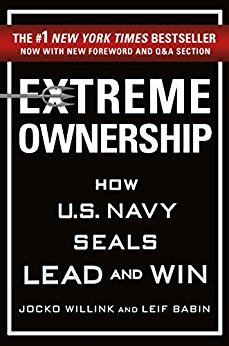
This article is an excerpt from the Shortform summary of "Extreme Ownership" by Jocko Willink and Leif Babin. Shortform has the world's best summaries of books you should be reading.
Like this article? Sign up for a free trial here .
What is the key to being a great leader? Is it about having the right personality type, training, or team? Former U.S. Navy SEALs Jocko Willink and Leif Babin, authors of Extreme Ownership, argue that the best leaders take responsibility for every aspect of their team and every task they’re working to accomplish.
With an Extreme Ownership mindset, a leader can implement key strategies to help her team achieve its goals. The authors collectively call these the Laws of Combat.
Introduction
Extreme Ownership requires a leader to own her team’s mistakes and failures — without blame or excuses — and objectively assess what works and what doesn’t in order to constantly improve. As Willink and Babin warn, the concept is simple but not easy.
Willink and Babin honed the leadership principles of Extreme Ownership while serving in Ramadi, Iraq, the deadly and hostile center of enemy insurgency, during Operation Iraqi Freedom. After their military careers, they helped companies apply the same tenets in a corporate context through their business consulting firm, Echelon Front.
Each chapter of the book examines a different aspect of Extreme Ownership and is divided into three sections — one explaining the core principle, another illustrating how it proved pivotal on the battlefield in Ramadi, and the last showing how it applies in a business setting.
Laws of Combat
With an Extreme Ownership mindset, a leader can implement key strategies to help her team achieve its goals. The authors collectively call these the Laws of Combat.
The first strategy is Cover and Move. The entire team must work together, supporting and protecting each other, for everyone’s success. This requires breaking down silos between teams and departments to jointly accomplish the company’s larger mission.
The second Law of Combat is to keep things simple. Simple plans lead to success. If you keep plans simple and control what you can, your team is more likely to understand the plan and better able to adapt when something inevitably goes wrong.
The third strategy is Prioritize and Execute. When it feels like there are five fires that need to be put out at the same time, a leader has to be able to calmly take stock of the situation, decide what needs to happen first, and carry it out. Trying to address several issues at the same time is overwhelming and inefficient; instead of dividing your efforts, you will be more effective by putting your focus and resources toward tackling one issue at a time, starting with the most pressing.
The fourth and final Law of Combat is Decentralized Command, which means the leader spreads her authority to be more efficient. You can only effectively manage about six to 10 people, so on larger teams you need junior leaders to delegate tasks to. Empower these junior leaders to take actions and make decisions (within their authority), and let them know that you will back them up; this frees you up to lead and keep your focus on the big picture.

———End of Preview———
Like what you just read? Read the rest of the world's best summary of "Extreme Ownership" at Shortform . Learn the book's critical concepts in 20 minutes or less .
Here's what you'll find in our full Extreme Ownership summary :
- What Extreme Ownership means, and why every responsible leader needs to get it
- How to get your team working smoothly together
- How leadership principles from Navy SEAL teams work in everyday business and life






